Information/Write-up
THE VILETONES: DEATH TO THE DABBLERS
A True and Possibly False History of the Last Toronto Punk Band That Mattered
“They’re not making a statement. They know no-one listens unless it’s to call you a hypocrite. And besides, they aren't that pretentious.”
— Jeremy Gluck
In 1976, a kid named Steven Leckie walked onto a Toronto stage, cut himself open with glass, smeared his blood on the front row, and birthed the Viletones — possibly the most gloriously self-immolating act of punk rock's first wave.
He called himself Nazi Dog, not out of ideology, but as a deliberate affront — to audiences, to punk orthodoxy, and to the Toronto suburbs that raised him. The band’s shows weren’t concerts, they were exorcisms. “It’s like doing Apocalypse Now every night,” Leckie once said. “And I’m always Kurtz.”
Alongside bands like The Diodes and Teenage Head, the Viletones helped form the holy trinity of Toronto punk, but they were always the chaos wing — too violent for the mainstream, too pure for the poseurs. Leckie wasn’t singing about alienation. He was alienation.
“If I die when I’m 24, I don’t care. One thing I know is, I’m not going to live past 30.”
— Leckie, age 20, stitched up and covered in motor-oil blood
LOOK BACK IN ANGER, their first EP (1977), is still considered one of punk’s purest artifacts. Raw, brief, and terrifyingly alive. But unlike other punk bands who signed to majors and sanded off the edges, the Viletones refused to be tamed. Managers quit. Labels flinched. The band went further underground.
Leckie became infamous for his refusal to rehearse — or as one critic put it, “the only band that’s acquired any degree of international celebrity on the strength of their first EP and a handful of uncompromising performances in New York and England.” In a time of slogans and safety pins, Leckie was too real for fashion. He was Baudelaire with blood on his boots.
“They hear Trudeau say something smart and they get offended. He’s an intellectual, and they can’t handle it.”
— Leckie, crucifying Canadian culture
And then… he vanished.
PART 2: LONDON FOG, FLEURS DU MAL, AND THE ART OF BLEEDING
“The Viletones aren’t trying to prove anything to anyone. Or judging from the outside world — even themselves.”
— Toronto Star, 1994
Sometime in the early '80s, after scaring the shit out of Toronto, Leckie left. Where most punk casualties ended up on milk cartons, he turned into a ghost with a passport — living in London from '95 through '98, diving headfirst into the underground art world, “hanging out in the ruins with the painters,” and making art that bled like his lyrics once did.
Back home, he re-emerged under his birth name, Steven Leckie, and opened Fleurs du Mal on Queen Street East — part boutique, part museum of madness. Named after Baudelaire’s ode to beauty and rot, the shop was a crash site of glam, glitter, bones, vintage jackets, riot gear, dead poets, and righteous snarl. Every item was curated with the gravity of a blood pact. “We don’t cater to squares or seekers of mass-produced corporate clothing,” he told the Toronto Sun. No shit.
“What we’re doing here is glitter rock and punk — the two sexiest sides of the ’70s.”
— Leckie, now a fashion anti-retailer with a Nietzschean streak
Posters of Sid Vicious and handwritten slogans ("Clothes For Heroes") hung beside t-shirts from Vivienne Westwood’s SEX. The Barenaked Ladies weren’t allowed in. The Vatican got a copy of the catalog. Somewhere between punk rock, fashion installation, and dadaist fuck-you, Fleurs du Mal became the most important art project Toronto didn’t understand.
He also started painting — violently. Barbed wire halos. Charcoal wounds. Faces erased in layers. It was art that looked like it had survived a riot. (“You can’t take my art away,” he told the Star, “It’s like a war wound.”)
In 1999, he appeared — shirt open, cigarette in hand — at the Du Mal gallery, surrounded by paintings that looked like demon archives. A decade earlier, he was swinging chains onstage. Now he was exhibiting at group shows alongside Satanic puppetry, freak-show fashion, and post-porn children’s theatre.
“He’s always Kurtz.”
— Mary Harron (I Shot Andy Warhol, American Psycho), who cast Leckie in a role in American Psycho, calling him “the talented psycho we all seek in the heart of darkness.”
But art never replaced punk. Punk became art.
By the mid-’90s, The Viletones returned — not with nostalgia, but fury. Shows at the Opera House, Lee’s Palace, and across Europe followed. They weren’t legacy acts — they were still dangerous, and still better than most of the bands they inspired.
“They’re not that sophisticated, you see… That’s the difference with me. It’s Jean Cocteau, man — if they don’t get it, fuck ‘em.”
— Leckie on The Tragically Hip and the culture of Canadian mediocrity
He hated grunge (“It’s just heavy metal in thrift store clothes”), dismissed Nirvana’s sincerity as cowardice, and swatted away any mention of the industry like a fly:
“I don’t want your music paper. I don’t have a lawyer. I don’t do deals. I make art.”
He didn’t just reject fame. He crucified it.
PART 3: DEATH TO THE DABBLERS — A MANIFESTO IN BLOOD AND GLITTER
“Should I let them in? They look like dabblers.”
— Steven Leckie, glaring at kids in Adidas jackets
By the time the '90s swung around and the industry started rounding up “alternative” bands like they were cattle, the Viletones were sharpening their knives again. New bands were playing punk. But the Viletones had become punk — or whatever lay beyond it. They weren’t part of the genre. They were the genre’s warning label.
Leckie saw through the sheen:
“It’s all about youth, sex, and style — and a lot of musicians don’t bother to step out of the musical realm. But you can step into Rimbaud or Picasso.”
He did both.
He also threw up outside the Horseshoe Tavern and judged your haircut.
In interviews, Leckie routinely rejected the nostalgia industry, spat at lazy mythologizing, and warned against turning raw rebellion into a coffee table book. He quoted Cocteau, insulted The Tragically Hip, and blamed CanLit mediocrity on a national allergy to passion:
“They hear Trudeau say something poetic and they get offended — their meek-minded mentality won’t allow that. He’s a fucking intellectual and they can’t handle it.”
Where others were canonized, Leckie stayed in exile. No PR team. No merch empire. Just a living contradiction in eyeliner, making art, dodging rent, and still shattering himself for the stage.
When the Viletones returned to Lee’s Palace or the Opera House, the audiences didn’t come for the songs. They came for the ritual. Blood, chains, coats on fire. Songs like “Danger Boy” and “Screamin’ Fist” didn’t date — they mutated. Leckie’s voice, half snarl, half invocation, stayed feral.
“You can’t take my art away. It’s like a war wound.”
— Leckie, cradling a canvas like a weapon
A WORD ON THE NAME
Leckie took heat for the “Nazi Dog” moniker early on, but he always shrugged it off with venom or irony, depending on his mood.
“I ain’t no Nazi,” he once told The Star. “But I wanna be a dog. I like dogs. I used to own a dog until I became my own dog.”
Critics didn’t always get it. Journalists swarmed the stage; some wrote Leckie off as a provocateur. Others saw something more uncomfortable — an artist dragging trauma, violence, and beauty into the spotlight and refusing to clean it up for mass consumption.
Even Danny Fields (Ramones manager, punk tastemaker, godfather of outsider cool) wrote:
“If you want to talk about the power of music itself — not the band or its visual froth — in ‘swaying the mob’ toward a fascist or neo-fascist state of being — well, that’s another essay.”
Leckie never asked for that essay. He just kept bleeding for the next line.
EPILOGUE: A CULTURE THAT NEEDED THEM
“Some people must come out when the culture needs them. Some people must come out and moan and squawk and scream ‘Fist!’ — and not do anything about it. Knowing that if I don’t, then I am not fulfilling my role.”
— Steve Leckie, 1994
From high school dropout to transgressive icon, from blood onstage to barbed wire halos in gallery walls, Steven Leckie is the rare figure who refused to shrink for the sake of fame. He made no careerist pivots, no cleanup albums, no Vegas reunion acts. His band didn’t get sober — it got meaner.
And the Viletones?
They’re not an artifact. They’re not a reunion.
They are still unresolved.
“If I’m not nice, it’s because I’m not running for office.” — Leckie, 1999
He never did. But he rewrote the book on how to destroy the office before someone else tries to put your name on it.
-Robert Williston
Steven Leckie: vocals
Steve Koch: guitar, backing vocals
Sam Ferrara: bass, backing vocals
Tony Vincent: drums
Ray Bailie: additional drums on 'Danger Boy'
Produced by Steve Leckie and Steve Koch
Engineered by Doug McClement
Recorded Live at Larry's Hideaway, June 11, 1983 with the Comfort Sound mobile studio
Mixed and produced at Comfort Sound, Nov. 12, 1983
Jacket design by Gerard Coffey
Back cover photo by Doug Johnson
Liner notes:
The first time I ran across the Viletones, Steven Leckie heaved a beer bottle at me. Bad enough it was an empty beer bottle. Worse, we hadn’t been properly introduced.
All this came about in the later 1970s in the halcyon days of punk in Toronto, Canada when Leckie — then fronting the media as the very tartly nasty, flesh-pursuing Nazi Dog™ — was staking out new territory in self-abuse.
Nazi Dog would slash his arms and throw beer bottles.
He’d scream such things as “fuck me” and he’d weep as if he’d bled in shock.
Sometimes he’d puke. Sometimes they’d spit and throw things. The band spit out some things back.
“A lot of spiritually evil things happened,” he now remembers.
The Sex Pistols had landed punk in the media and everybody was doing an anti-show. So Nazi played to the gallery growing around him. He meant every word of it, lest anyone thought he was faking.
It was all very anti-him, what with all these new kinds of drugs allowing for different artificial stimulants flowing freely through one’s bloodstream and giving practically superhuman strength.
But it was also very theatrical. Nazi Dog staged nightly morality plays in rundown hotel and room venues. The band was the band and crashed human want and ruin. Chaos was at the ready. His head was never quite sure of what side of the street the sidewalk was on, but he just went on the end of it to understand he was killing himself.
But Steven is not so innocent. First let me say something about the music: It’s powerful rock music from some corner of the heart that’s sick, riled up, obsessed and cold to the touch but rock’n’roll. Not exactly the sort that because it’s rock’n’roll it should save you.
Whether it was the booze or any of those other narcotics such as keeping up with things in New York, the Viletones were the real deal. The band looked and played the part. They bled. You felt some of it. They didn’t only mean it — there was a sense of fine detachment. A drug some sort of evil, but kind of very stylish for reforming, meant they were one of the great anti-heroes of my life and the history of rock’n’roll. The tape sessions ended and Leckie started up a new band called The Disciples and that drinker sort of person was gone.
As for him, he was imploding. Things inside were breaking down. All the booze had finally caught up with him. He was writing. The real world had nudged him into writing about itself. The heart broke often. “Outta My Mind,” the title song from the new record is about someone you love but can’t find. He realized he needed help, got some help and sought it. And he embraced his friends.
If there’s one thing about the Viletones it is that they symbolized life and death, love and hate with a kind of flare and sense of serious style that we all knew without the music, the life was gone.
Whatever else you may think about the band or even this music, it is what we once could call want for and not be ashamed to seek.
And that’s rare enough these days.
-Peter Goddard, Toronto Star, November, 1983
Thanks to the people at Topaz and Larry’s especially Fred Chagpar, Joe and Lori and Ann Pustil
Also thanks to the ones who believed: Dean “The Taz” Owen, Lorraine, Myla and Dad
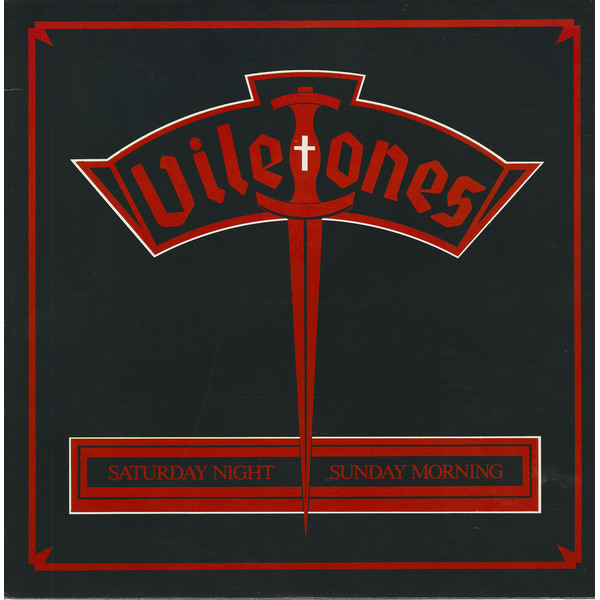
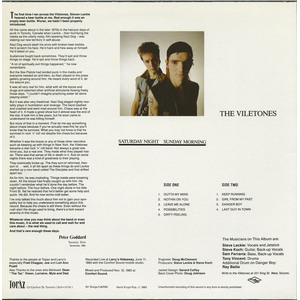
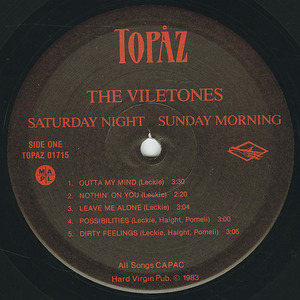
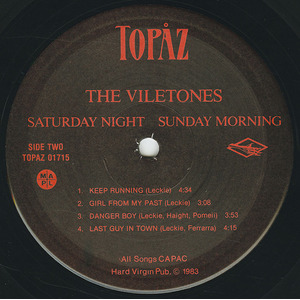
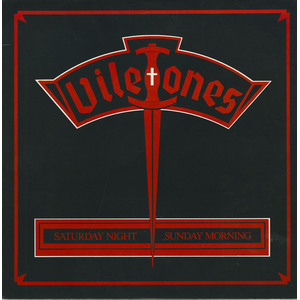
No Comments